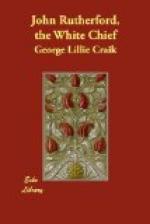Such acts of retaliation as that to which the brother of Ahoudee Ogunna here had recourse are often resorted to by the chiefs with something of a similar design, to avenge themselves, namely, for injuries which they conceive they have sustained, or to bring about those ulterior measures by which they may obtain for their grievances complete atonement or redress. In this way, many wars arise. But it is a point of honour with a chief never to touch what belongs to those who have trusted themselves to his friendship, and against whom he has no claim for satisfaction on account of any old affront or outrage. To be supposed capable of doing so would be felt by any of them as an intolerable imputation.
[Illustration: A waist-mat. Christchurch Museum.]
We find a striking instance of this, to pass over many others that might be quoted, in the conduct of Tetoro, who returned home to New Zealand from Port Jackson, along with Cruise, in the “Dromedary.” It was thought necessary, during the passage, to take from this chief a box containing some gunpowder, which he had got with him, and to lodge it in the magazine until the ship arrived at New Zealand. “Though every exertion,” says Cruise, “was used, to explain the reason why he was requested to give it up, and the strongest assurances made that it should be restored hereafter, he either could not or would not understand what was said to him. Upon parting with the property, which, next to his musket, was in his eyes the greatest treasure in the world, he fell into an agony of grief and despair which it was quite distressing to witness, repeatedly exclaiming, ‘No good,’ and, rolling himself up in his mat, he declined the conversation of every one. He remained in this state so long that the powder was at length brought back; but he refused to take it, saying, ’that they might again put it in the magazine, since they must now be aware that he had not stolen it.’”
Similar to that of Tetoro, was the conduct of a chief whom Marsden met with on his first visit to New Zealand, and who was so much grieved and ashamed at the circumstance of one of his dependents having stolen some trifle from that gentleman, that he sat for two days and nights on the deck of the ship, and could not be prevailed upon to enter the cabin.[BB]
FOOTNOTES:
[Footnote AT: I pea, “Of course.”]
[Footnote AU: Kanikani, to dance, as in the haka.]
[Footnote AV: These words are not in accord with the present system of spelling, there being no “sh” and no “c” in the Maori orthography. The former name is probably Hau, and the latter Peka. The letter “E” placed in front of them is used by the Maoris to denote the vocative, and Rutherford has evidently taken it as part of the word. Sometimes the “E”—which is pronounced as “a” in “pay”—is placed both before and after the name of the person addressed, as “E Peka, e!”]




